Eviction of ‘Today’s Carolinian’ staff from its office: an attack on press freedom, say student journalists.
Campus Press

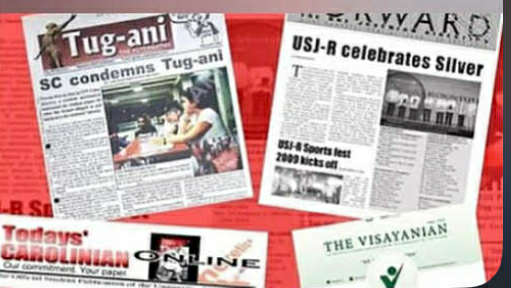
Eviction of ‘Today’s Carolinian’ staff from its office: an attack on press freedom, say student journalists.
CJJ asked “Today’s Carolinian” for update on the dispute between the paper’s staff and the USC administration. The situation, as of Oct. 22, 2025, according to TC’s editor-in-chief and a managing editor:
■ Office space: They have not gotten back the office from which they’ve been evicted. They also have not been given new office space.
Official recognition: TC is still not recognized by the USC administration as official student publication.
Funding: No funding and obviously USC doesn’t collect school publication fee from students for TC, as is usually done in many other schools.
■ The reason for all that: The student journalists running the paper “decided not to undergo accreditation.”
It’s the policy of the school that student organizations and publications shall register with OSFA to get funding, office space, and other school resources.
■ Form: mostly digital. They’re retrieving content from past printed copies of “Carolinian” into a website called TC Digital Archives, where they can be read, a project on which the publication and the USC Museum collaborate.
They’re not totally leaving the print edition though.
It has produced, since TC’s “defundment” in 2019, a literary, physical zine titled “Sancto” for the 2025 Cebu Art Fair.
They hope their return to print “steadies,” that is, they get back their office and funding. One wonders though how that will happen if TC doesn’t submit to accreditation.
■ Initiatives in the House: They don’t know the state of reported efforts to investigate the USC-TC controversy, initiated by a congressman’s resolution, and the proposal to amend the Campus Journalism Act. — PAS
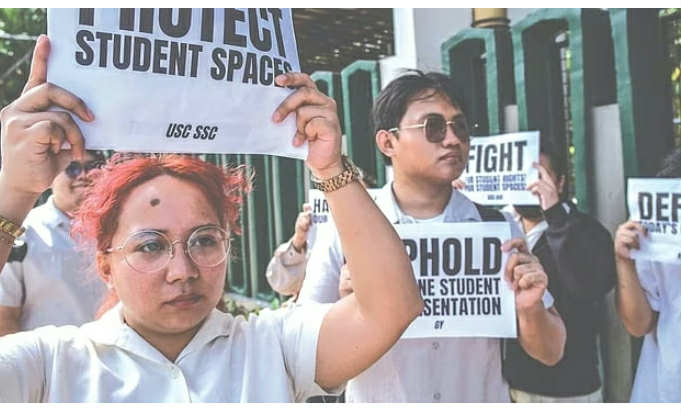
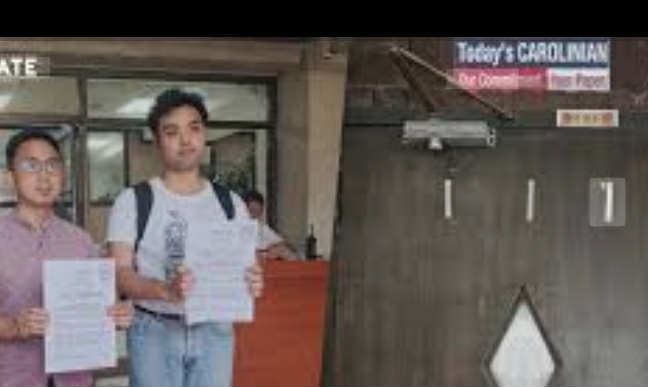
Protesters outside the Talamban campus of the University of San Carlos. Eviction took effect Jan. 15, 2025.
1. The USC journalists said; the school managers said: local news media report on the issue
CLAUDINE FLORES
First published in SunStar Cebu
Jan. 21. 2025. Adapted to CJJ
Oct. 22, 2025.
STUDENTS from the University of San Carlos (USC) held a protest outside their campus in Barangay Talamban, Cebu City on Tuesday, Jan. 21, 2025, in defense of press freedom and the restoration of their student publication office, following an eviction notice issued by the university administration.
Today’s Carolinian has been evicted from its office, Room G112, which is now being repurposed for USC’s alumni affairs.
This change was formalized with a notice effective from Jan. 15, according to a posting on the office door.
Althea Tumulak, associate editor-in-chief of Today’s Carolinian, led the protest organized by the Rise for Education Alliance–USC.
Tumulak demanded the reinstatement of Today’s Carolinian as the official student publication, the funding of the magazine and the return of their office space.
She also criticized the USC move as an attack on press freedom, highlighting the bureaucratic hurdles imposed by the Office of Student Formation and Activities.
Administration’s stance
Lawyer Joan Largo, USC’s vice president for administration, defended the decision in a phone interview with SunStar Cebu on Tuesday.
Largo said the space reallocation was necessary due to the limited campus space and the underutilization of the room by Today’s Carolinian throughout the year.
The alumni affairs office, which is adjacent to Today’s Carolinian’s office, is housed in a “cramped area that there is no space to confer with visiting alumni,” according to Largo.
“This is but a prudent use of our limited campus spaces, nothing more,” Largo said.
The official said that the student journalists are still students and that she is waiting for them to reach her office.
“The students can always reach out to us for any student-related concern,” Largo said.
When asked if Today’s Carolinian had reached out to them, Largo said “no.”
However, the official’s explanation has not quelled the discontent among students and supporters.
Tumulak said they have reached out to the USC administration after posting on their Facebook account about the directive.
“They responded that since the office has been mostly unutilized and closed throughout the year, it is prudent for alumni affairs to use it,” she said.
Criticisms
The eviction has also sparked widespread criticism from various student groups and the College Editors Guild of the Philippines (CEGP).
“Today’s Carolinian, serving as the official publication of the university, has been defunded by the administration since 2019 for its critical reportage on TOFI and repressive policies against the studentry,” read a portion of CEGP’s statement issued on Friday, Jan. 17.
Petition campaign
Brell Lacerna, CEGP’s national spokesman, described the action as a violation of democratic rights, particularly in light of Today Carolinian’s critical reporting on tuition hikes and university policies.
In response to the eviction, Today’s Carolinian has initiated a petition campaign aimed at rallying support for student press rights and the reclamation of their office space.
“We want to let the students know that the fight for student rights and democratic spaces within the university continues,” she said. “We are going to make TC (Today’s Carolinian) unkillable, and we need your help and support.”
The rally marks a significant point of contention at USC, highlighting broader issues of freedom of expression and administrative oversight in educational institutions. 
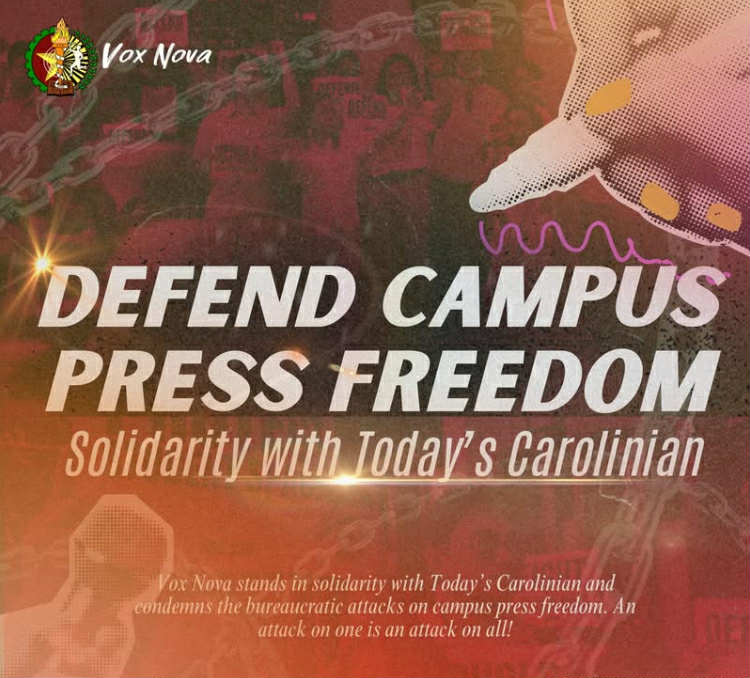
Publicity material on the eviction issue at USC.
2. Eviction, defunding ‘spell weak’ campus press freedom
Campus Journalism Act of 1991 or Republic Act #7079 falls short of ensuring campus press freedom, said Kabataan Party-list congressman Rauol Manuel in an interview with FEU Advocate in February 2025.
SHAYNE ELIZABETH T. FLORES
and KASHARELLE JAVIER
First published in FEU Advocate
Feb. 2, 2025. Adapted to CJJ,
Oct. 22, 2025
Kabataan Party-list (KPL) Rep. Raoul Manuel deemed that the Today’s Carolinian (TC) office eviction ordered by the University of San Carlos (USC) demonstrates that the existing Republic Act No. 7079 or Campus Journalism Act (CJA) of 1991 falls short of ensuring campus press freedom.
“Nakita natin sa case ng Today’s Carolinian na napakadali lang para sa administration ng University of San Carlos na hindi mag-grant ng funding para sa Today’s Carolinian dahil lamang active sila mag-cover ng issues na relevant sa mga estudyante, lalo na halimbawa ang pagtaas ng tuition and other school fees sa kanilang university,” he said in an interview with FEU Advocate.
TC was defunded and has been operating independently since 2019 due to its critical coverage of USC’s administrative policies, particularly issues such as tuition and other fee increases (TOFI).
Last January 17, TC reported receiving a notice from the administration pasted on their remaining office at USC – Downtown Campus, demanding them to vacate the room to make way for the Alumni Office, effective January 15.
House resolution filed
Claiming that the vacate order violates academic freedom, the Makabayan bloc, through Manuel and College Editors Guild of the Philippines (CEGP), filed House Resolution No. 2193 against USC to the House of Representatives last January 23.
In a separate interview, CEGP spokesperson Brell Lacerna argued that the CJA is outdated and can be weaponized by school administrators to suppress student publications, as proven by TC’s case.
“CJA of 1991 remains weak, outdated, and toothless… Without provisions to mandate [the collection of] publication funds, or to mandate schools to establish student publications, or to penalize school administrators for vilifying student publications with various press attacks, CJA [of] 1991 is loose to recognize press freedom of the studentry,” he said.
Where violation lies
Lacerna also pointed out that the USC’s violation of the act lies in its failure to uphold the editorial independence of student publications and its anomalies in using allocated funds, which should have been directly handled by TC and require further investigation.
According to Section 5 of CJA, “no instance shall the Department of Education, Culture and Sports or the school administration concerned withhold the release of funds sourced from the savings of the appropriations of the respective schools and other sources intended for the student publication.”
No guarantee of consequences
Despite such provision, there is no guarantee that USC will face consequences due to the claimed flaws in the CJA. Hence, Manuel highlighted the need to strengthen administrative accountability.
“Given ang mga weakness ng Campus Journalism Act, sa totoo lang, at this point, hindi magiging madali… Kaya all the more na dapat talaga maisabatas ang mga puwedeng penalties, mga administrative na mga sanctions na puwedeng ipataw du’n sa mga administrators na ginagamit ‘yung kanilang posisyon para apakan ‘yung fundamental rights ng kanilang mga constituents,” he stressed.
Given the CJA’s shortcomings, the resolution also aims to push for house bill Campus Press Freedom Bill (CPF) to reform the existing law.
“Na-file natin itong House Resolution No. 2193 para mag-dig deeper du’n sa ganitong recent na nangyari, while ang gusto natin din in the long run ay magkaroon talaga ng mas matibay na proteksiyon for student publications sa porma ng Campus Press Freedom Bill na siyang magiging alternative natin du’n sa Campus Journalism Act,” the KPL representative added.
More than 100 violations
Similarly, Lacerna emphasized the urgent need to pass the CPF Bill to recognize genuine funding for student publications and uphold editorial independence.
“It is time that we penalize school administrators that violate campus press rights, and furthermore, investigate more than a hundred campus press freedom violations in the Philippines,” he said.
Introduced by KPL in 2011, the 13-year-old bill reinforces campus publications’ rights and sets specific sanctions for campus press violations, among others.
CPF was left pending at the committee level in 2011, but was refiled in 2013 and 2016. It has yet to be passed as of writing.
As a result, Manuel urged lawmakers to review their filed resolution and forward the CPF through the technical working group approved by the House Committee on Higher and Technical Education last year.
“[In] that way, napag-uusapan natin itong nangyari sa University of San Carlos, at meron na rin tayong magiging batas para hindi na mangyari ito sa kahit [anumang] student publication saang bahagi man ng bansa (this incident in University of San Carlos will be talked about and we will have a law to prevent this from happening in any student publication in any part of the country),” he said.
Below-the-belt eviction
Meanwhile, Lacerna described TC’s eviction as ‘below-the-belt’ as it violates students’ press freedom, reflecting an appalling trend among private universities in the Philippines, exposing the colonial, commercialized, and repressive education system.
Lacerna also added that the USC administration dismissed TC’s editorial independence and pressured the publication to be accredited under the Office of Student Formation and Activities (OSFA) to regain funding and office spaces.
According to the CEGP spokesperson, TC’s case would likely ignite discourse among USC’s student body regarding issues on TOFI and repressive policies that threaten students’ democratic rights.
For Lacerna, the case will serve as an avenue for student publications to further criticize the current education system and build stronger alliances to expose the threats to campus press freedom, as well as the need to prioritize education concerns.
The CEGP spokesperson called for an end to the longstanding struggle of the USC students through collective action while urging the administration to cooperate with its students, especially in the discourse on TOFI, and to recognize student councils and publications as academic representations.
TC has garnered support across various student organizations, both national and local, following the publication’s displacement.
Last January 21, members of Today’s Carolinian and The Rise for Education Alliance – USC, joined by progressive student organizations, held a protest in front of the USC Talamban Campus to highlight the importance of campus press and fair democratic representation.
Collaborating on initiatives
CEGP is currently collaborating with TC, along with Cebu-based publications to advance initiatives such as petition-signing, alliance building, and reclaiming student spaces within the university.
In an effort to support the publication, TC has opened an avenue for donations through GCash, with details available on its Facebook page. – With reports from Mark Vincent A. Durano 
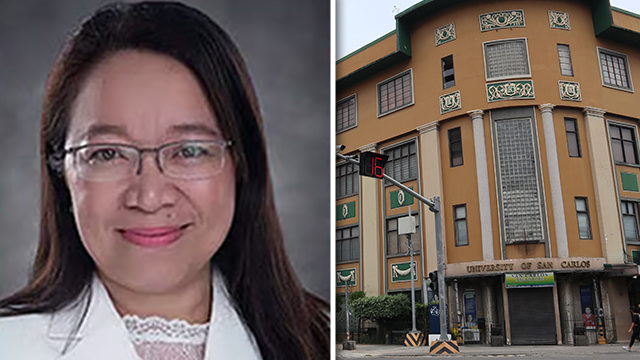
Atty. Joan Largo, USC vice president for administration.
3. No repression of ‘Carolinian,’ USC said, even as campus journalists made demands other than getting back office space.
Atty. Joan Largo, USC vice president for administration, said campus journalism is needed but there are limits to press freedom. “The enemy is not in the halls of USC, not in the USC family,” said Atty. Largo in January 2025.
PACHICO A. SEARES
First published in News+One,
SunStar of Jan. 22, 2025. Adapted
to CJJ, Oct. 22, 2025.
[] A protest of “Carolinian Today” campus writers — held Tuesday, January 21, 2025, at University of San Carlos (USC) Talamban campus in Cebu City — called for “press freedom” and return of the publication’s office at the main campus. An eviction notice was posted on its door, setting a January 15 deadline, as the space will be used for USC alumni affairs.
[] Joan Largo, vice president for administration, admits “repurposing” the Carolinian office but won’t call it eviction. She says the school’s “limited resources” require that it be assigned to the office needing the space most
TAKEAWAYS from the protest and the position of the protesters and the USC administration:
[1] IMMEDIATE CAUSE OF THE DEMONSTRATION, which landed the incident in the news media, was the notice to the staffers of “Carolinian Toda” (TC) posted on the door of its office in USC’s main campus that the Alumni Affairs Office would use the space.
A news report quoted the word “repurpose” of space. Joan Largo, vice president for administration, called it “prudent use of limited campus spaces, nothing more.”
Atty. Largo told me Wednesday, January 22, 2025, the school’s Alumni Affairs Office is so “small and cramped” that there’s even no space to confer with visiting alumni. “In stark contrast,” she said the Carolinian office beside it “has been mostly unutilized and has remained closed for the most part of the school-year.”
[2] THERE ARE OTHER REASONS THOUGH, as can be gathered from what the protesters are seeking and as publicized by Althea Tumulak, Carolinian associate editor.
They also “demand,” aside from the return of their office space, (1) reinstatement of “Today’s Carolinian” as official student publication; and (2) funding of the magazine. Tumulak reportedly also “highlighted bureaucratic hurdles” allegedly set up by the Office of Student Formation and Activities.
The demands coincide with the list in a petition being reportedly circulated among the students. A post on the Carolinian FB page enumerates more demands. (See last paragraph in next item.)
[3] IS PRESS FREEDOM ANY WAY VIOLATED? A news report said the eviction “sparked widespread criticism from various student groups and the College Editors Guild of the Philippines or CEGP.” The news didn’t name one student group but quoted CEGP’s statement, which dwelt mostly on repression of the publication “for its critical reporting” of school administration policies. A Carolinian FB post said NUJP-Cebu joined the protest.
One can’t be certain about the issue of press freedom as the Campus Journalism Act of 1991 or Republic Act #868, has a number of flaws, topped by the law’s failure (a) to define “independence” and (to) provide a practical means for funding. In a July 21, 2018 “Media’s Public,” I tackled the question why the law has not worked.”
RELATED:
“Seares: Why law on campus press freedom has not worked and may never work,” July 21, 2018.
“Seares: Is campus press freedom less free than professional media?” April 21, 2018.
In April 2018, “The Bedan Roar” of the San Beda senior high school was prevented by school administrators from distributing 1,700 copies of the paper, which contained articles about then president Rodrigo Duterte’s illegal-drugs war and the proliferation of fake news. San Beda officials considered the content “too critical and too negative.” The incident was one of senator Leila de Lima’s bases for filing of a Senate bill that would’ve repealed and replaced the CJA. Obviously, she didn’t succeed as the now 37-year-old law is still cited by lawyers.
What happened in San Beda seven years ago wasn’t the case of the Carolinian, which, Atty. Largo said, continues to operate. It wasn’t clear though as to which of the student publication is still operating: its Facebook page or its magazine or newspaper.
[4] PETITION HAS LONGER LIST OF DEMANDS. TC’s Facebook FB page, in Wednesday’s posts, included a Supreme Student Council press release announcing student prosecutors. Of more interest and relevance were Tuesday’s FB posts, which included the news that a petition was being circulated to “demand that the USC administration recognize Today’s Carolinian as the school’s official student publication, reinstate TC funding and offices, support the freedom of TC coverage, and waive the traditional and bureaucratic application process of the OSFA, or Office of Student Formation and Activities.”
[5] PART OF FREEDOM’S COST. The TC post on Facebook also said the publication has been operating “independently” since 2019, “without funding from the university.” It also said donations may be made “through our finance officer.”
The school administration may not be repressing press freedom. But it may not also be encouraging it by not helping collect funds for the student publication.
Publication fee had long been part of the charges billed and collected by schools to fund student publications. Atty. Largo said the administration “does not control any funds of the paper” and she is right: the reason is that the school no longer collects funds for the publication.
The thinking of some schools, I wrote earlier on the issue, is that if they can’t control content of the student publication, they shouldn’t help it by funding or collecting the funds for it. That’s a lesson on hard-core journalism that student journalists have yet to learn or accept.
Atty. Largo said the Carolinian case is just a matter of prudence on the use of resources. The same sense of prudence may apply too on the matter of helping the school paper collect funds or providing a workplace for its writers.
On that office, I asked Atty. Largo if the student journalists can have its office again, as it did after its office was also closed in August a year or two ago. Her answer: “The process on space utilization is in place. All the students have to do is follow the process.” They can always reach out to her for any student-related concern, she said.
[6] LARGO SAYS CAMPUS JOURNALISM IS NEEDED, but there are limits to press freedom. “My personal view,” Atty. Largo told me, “is that press freedom is needed now more than ever.” She said there are many ills plaguing our society and citizens have to be vigilant, now more than ever.” Nothing to be gained in repressing press freedom “and repression is farthest from my mind,” she said.
“The enemy is not within the halls of USC, not in the USC family. The battle is to be fought out there, in the form of many social ills and government folly.”
Like the press freedom granted to professional journalists though, campus press freedom is subject to limitations such as laws on libel and contempt, sedition and inciting to sedition, and the like, which involves publication.
On student journalism in particular, Atty. Largo said, there’s the Campus Journalism Act, along with Commission on Higher Education (Ched) Memo #9, series of 2013, among others. On those laws, Largo said, “I assure you, there is no violation (by USC), even as I maintain there is no eviction.”
[7] A REVISIT ON THE ISSUE will be useful in schools confronted or threatened with the problem of student publications. Then maybe Congress will look at the Campus Journalism Act again and finally correct inadequacies of the law.
More particularly, protagonists need to settle the issue of how much freedom campus journalists can exercise and how much control the school administration can wield.
When the Councilor Rey Gealon ordinance on students’ rights was discussed in the Cebu City Council in 2013, I wrote about probable irritants in the relations between school administrators and student journalists, particularly regarding content offensive to the school.
Part of the Filipino culture is resisting and resenting a perceived assault from one’s own people with one’s own weapon. Some school owners and managers tend to rage against the school paper being used to hurt reputation of the institution and its administrators. A few others are control freaks who cannot accept a student publication operating independently of the school.
How independent shall the campus publications operate? A practical mechanism is needed and it’s not there in the Campus Journalism Act or the city ordinance. 
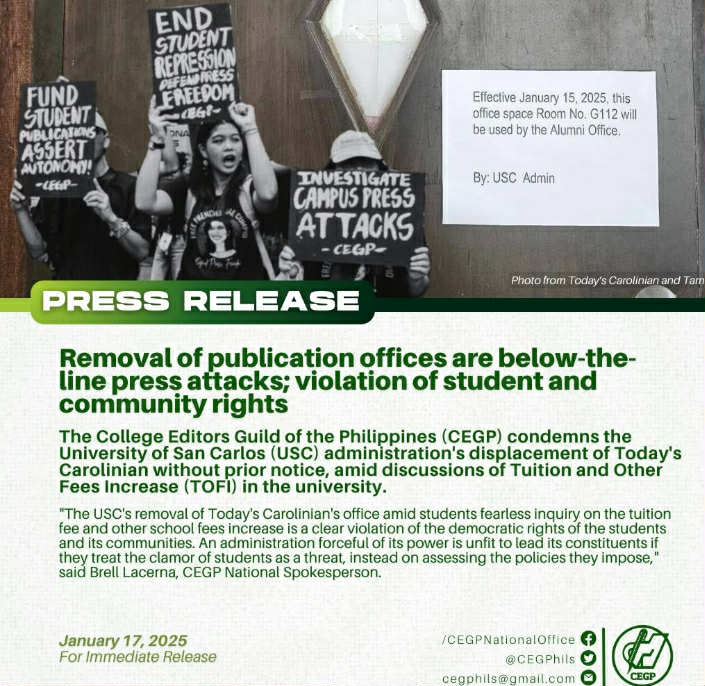
Campaign message of defenders of “student press freedom.
4. Freeman columnist, an ex-student journalist, sees ‘real risk’ to a school accused of repressing campus publication
IAN VINCENT MANTICAJON
First published in The Freeman
Jan. 28, 2025. Adapted to CJJ
Oct. 22, 2025.
Campus press freedom is a topic close to my heart because I was a student journalist in college, culminating in my role as editor-in-chief of UP Cebu’s student publication, Tug-ani, during my final year.
I recall that, as a lecturer at the college in the early 2000s, three UP Cebu student journalists were suspended for articles they had written. I stood with the student journalists in their struggle to reverse the decision. Thankfully, on appeal, then UP President Dodong Nemenezo overturned the suspension.
Today, it is rare to hear of students being punished for what they write. This is unsurprising, as we also now rarely see student publications that are independent and, even more so, critical of school policies. Outside of UP, most student publications lack the independence and editorial wherewithal to serve as truly relevant platforms that respond to the call of the times. Many focus on trivial campus issues or safe, interesting topics, rather than provoke critical thought or foster scholarly discourse.
It is, thus, both a pleasant surprise to learn about the student journalists of Today’s Carolinian at the University of San Carlos (USC) and a disheartening revelation to hear about their current struggles. They have reportedly been evicted from their office and have been left to independently collect publication funds since 2019, rather than having the school handle the collection –a practice permitted under the much-criticized Campus Journalism Act of 1991 (RA 7079), which has been blamed for the closure of several student publications in the 1990s that could not survive without school support.
The USC administration reportedly defended the eviction as a reallocation of the office for alumni affairs, describing it as a “prudent use of limited campus spaces.” However, Today’s Carolinian journalists view it as a pretext to undermine the publication’s standing, particularly in light of its history of critical reportage on tuition hikes and university policies.
That such independent and courageous student journalists stand firm for campus press freedom is admirable, though not entirely surprising. As a USC alumnus who earned my Law degree there, I know that USC attracts and nurtures intelligent and critical-minded students. During my student days in UP Cebu in the 1990s, Today’s Carolinian was home to some of the brightest and most talented fellow student writers, who thrived under the relatively progressive and nuanced leadership of the more tolerant school administrators of the post-EDSA period. I hope that ultimately this issue facing Today’s Carolinian will be resolved in favor of a critical and free campus press.
Private school administrators may argue that it is easier for us in UP to promote or even tolerate critical reportage and opinion from our student publications because we are state-funded. I believe this view is utterly misguided.
Since when has critical coverage from students truly affected a private school’s ability to make a profit or survive? It seems more a matter of bruising the ego of school administrators than impacting the financial bottom line.
Fostering critical discourse within a school often enhances its reputation as an institution that values intellectual rigor and accountability. People are more likely to respect and trust a school that encourages its community to engage with complex issues and challenge the status quo. If a school believes that student journalists are misguided or irresponsible, its greater responsibility is to engage with the students in nuanced dialogue, fostering principled divergence of views from the dynamics.
The real risk to a school’s reputation and business viability comes not from criticism but from suppressing it, which creates an environment that stifles innovation. 

